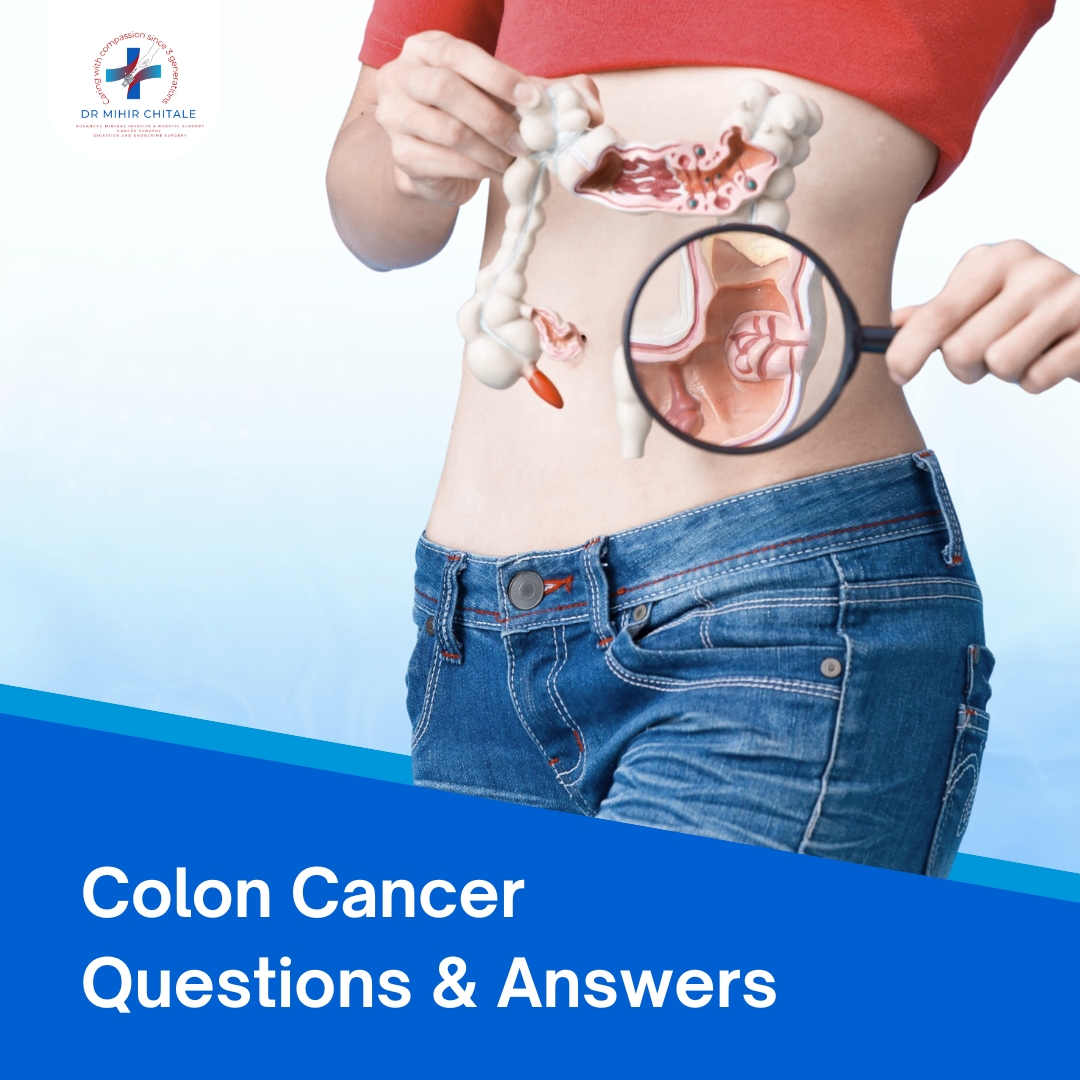
Colon Cancer Questions & Answers
1.Are there any risk factors that can increase the likelihood of developing colon cancer?
There are many different factors that can indicate the likelihood of developing colon cancer. People who have a high likelihood of developing this condition may decrease their chances by making lifestyle changes that eliminate as many risk factors as possible. Eating healthy, maintaining the recommended body weight, avoidance of alcohol and tobacco products and regular exercise can help to lessen the chances of getting colon cancer.
2. How is colon cancer diagnosed? What are the common screening methods?
Colon cancer is typically diagnosed through a combination of medical history, physical exams, and diagnostic tests. Early detection is crucial for successful treatment. Common methods of diagnosing colon cancer include:
Colonoscopy: A colonoscopy is a widely used and effective screening method. It involves using a flexible tube with a camera (colonoscope) to examine the entire colon and rectum. Polyps or abnormal tissue can be removed during the procedure for biopsy.
Fecal Occult Blood Test (FOBT): This test detects hidden blood in the stool, which may indicate the presence of polyps or cancer. It is a non-invasive and cost-effective screening method.
Fecal Immunochemical Test (FIT): Similar to FOBT, this test detects blood in the stool but is more specific for human hemoglobin, reducing the likelihood of false-positive results.
Flexible Sigmoidoscopy: This procedure involves using a sigmoidoscope to examine the rectum and lower part of the colon. It is effective for detecting abnormalities in the lower colon.
Virtual Colonoscopy (CT Colonography): This non-invasive procedure uses CT scans to create detailed images of the colon. It can detect polyps and other abnormalities.
Double-Contrast Barium Enema: This involves taking X-ray images of the colon and rectum after filling them with barium, a contrast material.
Biopsy: If suspicious tissue is found during any of the above procedures, a biopsy may be performed. Tissue samples are collected and examined under a microscope to determine if cancer is present.
Genetic Testing: In cases of a family history of colon cancer, genetic tests can identify certain gene mutations that increase the risk of developing the disease.
Blood Tests: Blood tests, such as carcinoembryonic antigen (CEA) test, may be done to monitor the progress of treatment or detect recurrence.
3.Are there any specific warning signs or symptoms that someone should watch out for after colon cancer treatment?
After colon cancer treatment, it’s important to remain vigilant for any potential signs or symptoms that might indicate a recurrence or complications. Here are some specific warning signs to watch out for:
Persistent Fatigue: Feeling unusually tired or fatigued that doesn’t improve with rest can be a sign of various health issues, including cancer recurrence.
Unexplained Weight Loss: Significant weight loss without a clear reason could indicate a recurrence or other underlying health problem.
Changes in Bowel Habits: If you experience changes in your bowel habits, such as persistent diarrhea, constipation, or changes in stool appearance, color, or size, it’s important to discuss these changes with your doctor.
Blood in Stool: Any occurrence of blood in the stool, whether bright red or darker in color, should be evaluated by a healthcare professional.
Abdominal Pain: New or persistent abdominal pain, cramping, or discomfort should be investigated, especially if it’s unrelated to dietary or other known causes.
Anemia: Unexplained anemia, which may present as fatigue, weakness, or pale skin, could be indicative of an underlying issue.
Changes in Appetite: A sudden loss of appetite or a lack of interest in food should be brought to your doctor’s attention.
Unexplained Pain or Discomfort: Any unexplained pain or discomfort, whether in the abdomen or elsewhere, should be assessed by a medical professional.
Swelling or Distention: Unexplained swelling or bloating in the abdomen, especially if it persists, should be checked.
Jaundice: Yellowing of the skin or eyes (jaundice) could be a sign of a problem with the liver or bile ducts.
Persistent Nausea or Vomiting: If you experience frequent or persistent nausea or vomiting, it’s important to discuss this with your doctor.
New or Unusual Lumps: Any new or unusual lumps, bumps, or masses should be examined by a healthcare provider.
Stay connected with your medical team for timely care and screenings.
4.Are there any lifestyle changes or habits that can help lower the risk of colon cancer?
Healthy Diet: Consuming a diet rich in fruits, vegetables, whole grains, and lean proteins can contribute to a lower risk of colon cancer. Limiting processed meats, red meats, and foods high in saturated fats can also be beneficial.
Regular Physical Activity: Engaging in regular exercise and maintaining a healthy weight can reduce the risk of colon cancer. Aim for at least 150 minutes of moderate-intensity exercise per week.
Fiber Intake: High-fiber foods, such as whole grains, legumes, and fruits, can promote healthy digestion and help prevent colon cancer.

